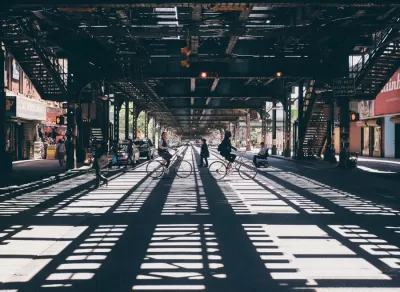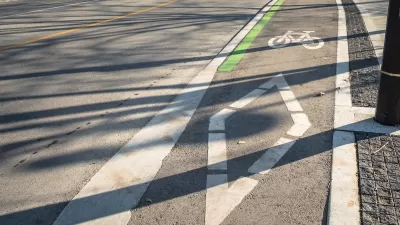Those in search of high-tech solutions for urban congestion and pollution often overlook the bicycle as a powerful, if simple, tool for reducing both and improving urban transportation.

Writing in Next City, Nicolas Collignon argues that it isn’t autonomous or electric vehicles that can change the future of transportation, but rather a much simpler technology: the bicycle. “Sparked by the pandemic, supported by people waking up to the climate crisis and now fuelled by the rising price of oil, we’re living through a bicycle renaissance,” Collignon writes.
Yet a “gap between our imagined future, the promises of techno-kings and the realities of progress” persists. To Collignon, this is in part due to the exciting future visions promised by technologists. But every flying car or delivery robot comes with its own massive set of implications for infrastructure and society. “When we begin to see technology through the lens of systems, it becomes clear that genuine technology-led progress will focus on dealing with the accelerating complexity of today’s world, not increasing the complexity of our tools.”
When it comes to bicycles, Collignon points out that while they are often more efficient and nimble, their very speed and flexibility prevent them from being easily quantified and “optimized” by algorithms. We don’t need to revolutionize the bicycle, “the fastest, most energy efficient, resilient, and lowest carbon emitting urban vehicle,” Collignon writes, but rather change the lens through which we view and organize urban mobility flows.
FULL STORY: Bikes, Not Self Driving Cars, Are The Technological Gateway To Urban Progress

Maui's Vacation Rental Debate Turns Ugly
Verbal attacks, misinformation campaigns and fistfights plague a high-stakes debate to convert thousands of vacation rentals into long-term housing.

Planetizen Federal Action Tracker
A weekly monitor of how Trump’s orders and actions are impacting planners and planning in America.

San Francisco Suspends Traffic Calming Amidst Record Deaths
Citing “a challenging fiscal landscape,” the city will cease the program on the heels of 42 traffic deaths, including 24 pedestrians.

Defunct Pittsburgh Power Plant to Become Residential Tower
A decommissioned steam heat plant will be redeveloped into almost 100 affordable housing units.

Trump Prompts Restructuring of Transportation Research Board in “Unprecedented Overreach”
The TRB has eliminated more than half of its committees including those focused on climate, equity, and cities.

Amtrak Rolls Out New Orleans to Alabama “Mardi Gras” Train
The new service will operate morning and evening departures between Mobile and New Orleans.
Urban Design for Planners 1: Software Tools
This six-course series explores essential urban design concepts using open source software and equips planners with the tools they need to participate fully in the urban design process.
Planning for Universal Design
Learn the tools for implementing Universal Design in planning regulations.
Heyer Gruel & Associates PA
JM Goldson LLC
Custer County Colorado
City of Camden Redevelopment Agency
City of Astoria
Transportation Research & Education Center (TREC) at Portland State University
Jefferson Parish Government
Camden Redevelopment Agency
City of Claremont





























